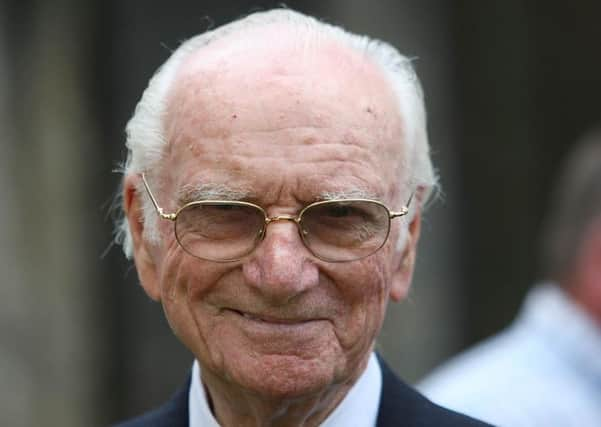A national treasure: Racing mourns Sir Peter O’Sullevan


Although he had been suffering from ailing health for some time, the passing of this national treasure still came as a shock to those who will never hear again the unforgettable words of the Voice of Racing who was the first sports commentator ever to be knighted.
He had the ability to engender tingling excitement with the slightest change in the tone of his mellifluous voice that became so familiar, and so unflappable, over 50 years. Retired racing great Tony McCoy tweeted: “Sir Peter O’Sullevan, the epitome of class. The most distinguished and eloquent voice of racing. He was an amazing man. R.I.P.”
Advertisement
Hide AdAdvertisement
Hide AdAnd his words were echoed by broadcaster Derek Thompson, who said: “He was the greatest commentator of all time, not just in racing but in all sports. What he had you couldn’t buy.”
It was not just Sir Peter’s velvet voice that stood out; it was his attention to detail and uncanny ability to find the right words as Red Rum – “he’s coming home like a fresh horse” – won a historic third Grand National in 1977 or “the mare’s beginning to get up” as Dawn Run made history in the pulsating final strides of the 1986 Cheltenham Gold Cup.
One of the last men to leave Aintree during the “bomb scare” National of 1997 – he did not want to be parted from his famous binoculars rescued from a German U-Boat – a conscious decision to visit the weighing room prior to the 1967 renewal was particularly fortuitous; it enabled him to familiarise himself with the colours of Foinavon, who was a 100-1 winner after a huge melee. It should also be remembered that Sir Peter had very few technological aids, other than his memory and commentator’s instinct, to assist him as he called over 14,000 races before retiring in 1997.
In many respects, he was an accidental broadcaster. He was already working for the Press Association in 1946 when he assisted Peter Dimmock with the radio commentary of the two-and-a-quarter mile Cesarewitch cavalry charge at Newmarket. Yet, when he finally earned a BBC trial, Sir Peter was nearly lost for words. “There’s nothing like a microphone to promote instant amnesia,” he once said.
Advertisement
Hide AdAdvertisement
Hide AdDespite this pessimism, he was off and running and his voice never betrayed bias when Sir Peter had the honour of calling the big races won by his top-class racehorses Be Friendly and Attivo – or if he had landed a particularly profitable betting coup.
A great acquaintance of Lester Piggott, he was racing royalty – he was The Queen’s personal guest at Royal Ascot on Ladies’ Day in the Diamond Jubilee year of 2012 – and often used his elevated status to criticise the BBC for scaling back its racing coverage.
“People pay a licence fee and they are entitled to see coverage of what, after all, is part of our national heritage,” he once told me.
“It always amazes me how many people are peripherally interested in racing. I get in a taxi a couple of times a day, and even though I’m an old geezer in his 90s, the driver will ask, ‘Are you still going racing, then Pete?’ Often it’s difficult to persuade them to take payment.”
Advertisement
Hide AdAdvertisement
Hide AdSir Peter may have been modest about his calls – he said he never delivered the perfect commentary and never scripted any lines because of the sport’s unpredictability – but he will be remembered as the people’s commentator and his like will never be heard again.
SIR PETER O’Sullevan was not just one of the giants of broadcasting; he was an acclaimed journalist who used his priceless contacts book to gain the inside track on many of racing’s most sought after stories including the incomparable Lester Piggott’s comeback.
Yet he was always incredibly modest about his commentary calls, none of which were pre-scripted, and instead cited the work of the Sir Peter O’Sullevan Charitable Trust as his most important achievement.
Set up after he called his last race in 1997, it has raised more than £4m for charities with close connections to horse racing and animal welfare.